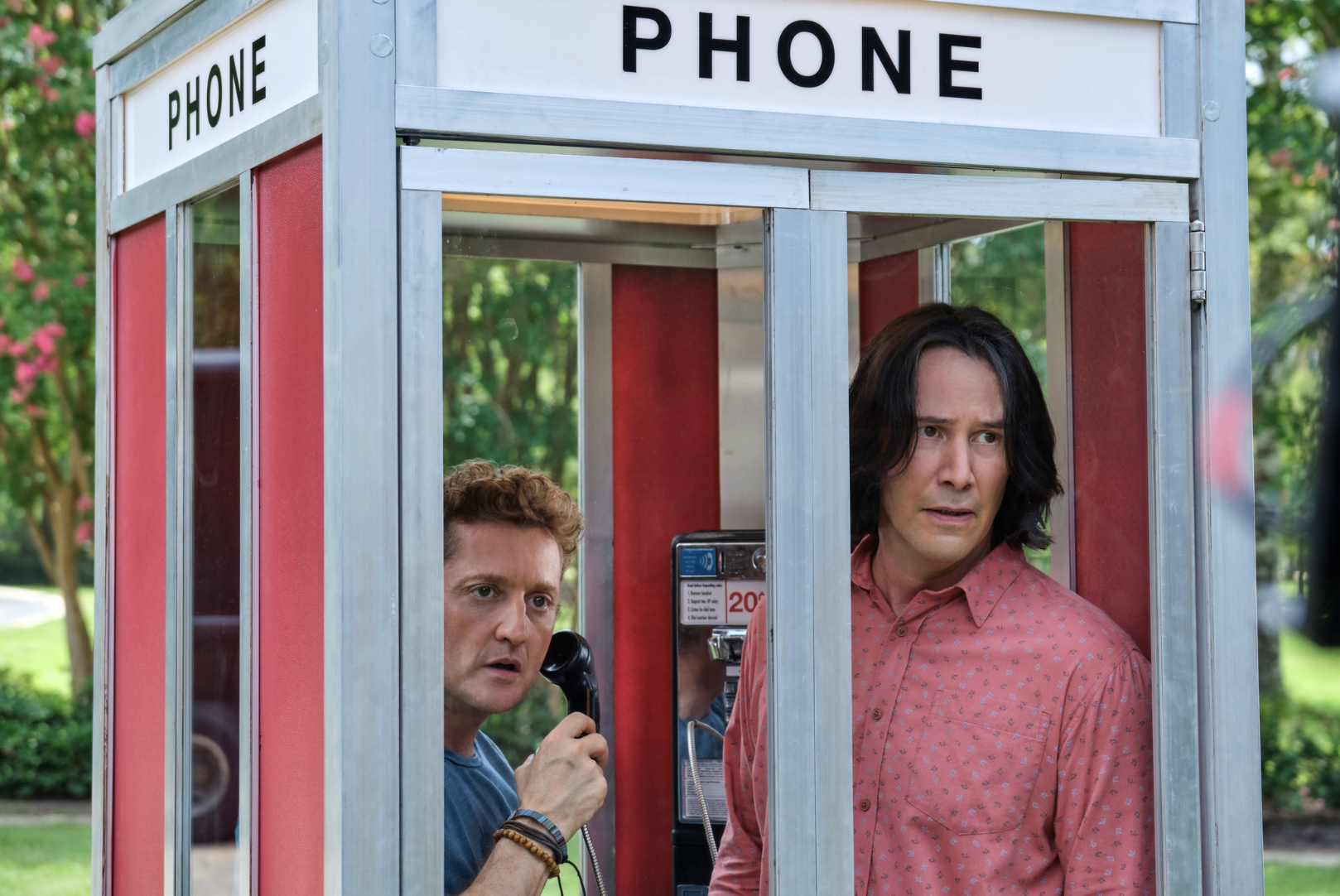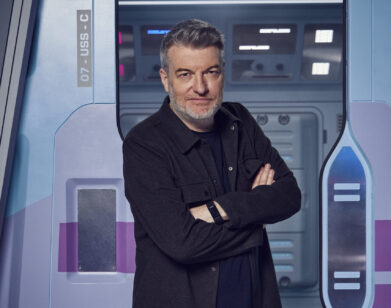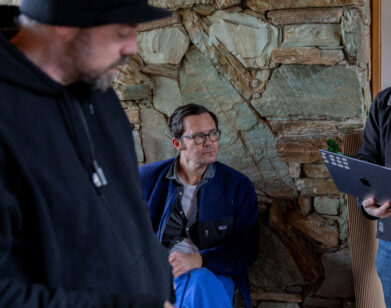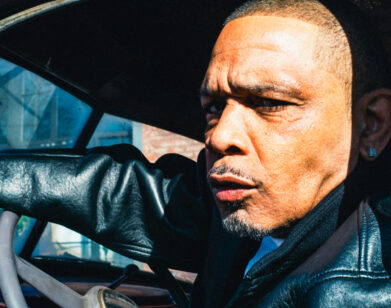the booth is the booth
A Most Excellent Reunion Between Bill & Ted Stars Keanu Reeves and Alex Winter

After years of stops and starts, online petitions, and will-they-or-won’t-they speculation, Keanu Reeves and Alex Winter have delivered. This weekend, Bill S. Preston, Esq., and Ted “Theodore” Logan are back to redeem humanity once more through the power of song in Bill & Ted Face the Music, the improbable third entry into an unlikely franchise about two happy-go-lucky rocker dudes who travel through time via phone booth and entangle themselves in fate-of-the-world hijinx. In the two decades since Bill & Ted’s Bogus Journey ostensibly closed the book on these characters, Reeves went on to become one of the biggest movie stars on the planet, while Winter carved out a career as a successful filmmaker. They didn’t need to make this movie. But when the writers Chris Matheson and Ed Solomon brought them a script that finds Bill and Ted, now middle-aged fathers, returning to their time traveling ways along with their children (Samara Weaving and Brigette Lundy-Paine), Reeves and Winter decided it was time to, well, party on.
———
BEN BARNA: What do you guys remember about the reception and the conversation around Bill & Ted’s Excellent Adventure when it was released?
ALEX WINTER: It was a little movie made by very young people, made by a division of Dino De Laurentiis’s company that went under after we finished shooting, so it sat on a shelf for a year. Keanu and I both kind of moved on with our lives. We were told flat-out that it was probably never going to come out, so we had diminished expectations, to say the least. And then it was bought out in a fire sale by a small company that tested the film, and it did incredibly well. It ended up coming out and, for the size of it, doing pretty well. I was doing other stuff and I kind of moved on. I remember I was shooting a music video somewhere in Austin, and someone told me to get a copy of Variety, that we were the centerfold—Keanu and I sitting on a giant pile of cash, which as far as I know, neither of us ever saw.
KEANU REEVES: I never saw that. But it was soft to sit on.
BARNA: A lot of sequels that arrive so long after the originals feel like a way to cash in on the IP. But you guys have been trying to get this made for the better part of a decade. Is it safe to call this a passion project?
REEVES: Absolutely. The writers came to us, Alex, what was it, like, nine years ago?
WINTER: It was a while ago.
REEVES: They had a great premise and there was a reason to tell this story and a real affection for the characters.
WINTER: We both stayed close with the writers, particularly Ed Solomon. Keanu and I both felt that the idea had integrity at its base, and that it had good comic potential.
BARNA: Did you ever lose faith that this project was going to happen?
REEVES: Early on, we had the great fortune to meet with Dean Parisot, the director. Suddenly we had a visionary, someone who understood the material and who could captain the ship. And so, through all of the travails on the business side, of rights and negotiating, there was the story that was keeping the Bill & Ted ship afloat.
BARNA: Was playing these characters again like riding a bike?
WINTER: There was a desire to not try to play them now the way they were back then. And that’s woven into the script, the notion that this is who they are now. They’re dads, they’ve got wives, and they have had a lot of life experience since we last saw them. We wanted to play that. I don’t want to speak for Keanu, but we’ve always played these guys pretty straight. And in terms of the riding-a-bike question, for me personally, because I’ve known Keanu a long time and we’re good friends and I like performing with him. There’s a repartee between the two of us that’s a fun playground to be in. So it was easy to fall back into.
REEVES: We were older people getting on bicycles, so we didn’t pop wheelies and do stoppies.
BARNA: The fact that they still use a phone booth is an automatic callback not just to the earlier films, but to an earlier time. What kind of discussions were there in terms of how to update this movie to fit our current culture?
WINTER: The booth is the booth. It’s what the characters know, and it’s also literally the device we need to utilize in order to solve the problem that we have. Beyond that, everyone was more interested in modernizing it by way of character, rather than culture. Our daughters are very modern. They’re using their smartphones and bopping around, and there’s a scene where I whip out a phone and show a photo to somebody. So we’re not immune to it, but the things that are important to us are more to do with family and music, so it really wasn’t a factor.
BARNA: This is a direct sequel to a movie that came out 20 years ago. Was there a concern that you might be alienating audiences who haven’t seen the first two? Was there ever any talk of making it a reboot as opposed to a sequel?
WINTER: We didn’t want to do a reboot, right Keanu?
REEVES: I don’t know. We kind of are doing a reboot. In the opening credits of the film, you see who these guys were when they were younger and a bit of their past, and hopefully for people who haven’t seen the other previous two films, they can kind of catch up to the spirit of what the film’s about. But the needle is certainly pointed right of center in terms of being slightly more accessible to people who have seen the other films. We made this picture for you. But bring your friends and family along, and they’ll catch up.
WINTER: To Keanu’s point, it’s a pretty simple narrative. It’s not the Marvel Cinematic Universe. It doesn’t require a Homeric understanding of other mythology .
BARNA: What is it about these two characters that have allowed them to linger in the public consciousness for so long?
REEVES: They’re funny.
WINTER: Yeah. They’re absurd guys with heart.
REEVES: The writing’s good, the characters are good, the premises are fun. It’s kind of like, “Oh yeah, Bill & Ted. Let’s watch that. Hey kids, come over here. There’s this wacky movie on.” I’ve had the experience of parents sharing the film with their 10, 11, 12-year olds, and I’m like, “Did they think it was funny?” And they’re like, “Yeah. My kids love Bill & Ted.” And I was like, “Cool.”
BARNA: I feel like this movie deals with the drudgery and the disappointment of middle age. Do you—
REEVES: Hang on a second. Wait, wait, wait, wait, wait, wait, wait, wait. I don’t think Bill & Ted Face the Music is about the drudgery of middle age. This story is about the pressures of having to write a song that will unite the world.
BARNA: I’m trying to dig a bit deeper here.
REEVES: But that is deep. It’s profound to have this kind of expectation on your life. Right?
BARNA: Yeah, sure.
REEVES: That’s relatable, and it’s not like we’re showing these guys and they’re like, “I’m making noises when I get out of bed,” or like, “God, mortality sucks.”
BARNA: I guess I’m referring to the part when they run into their future selves and their lives haven’t turned out the way that they had hoped.
REEVES: That’s because they haven’t written the song!
WINTER: In acting class, there was a long-running anecdote that when young people are told to improv as a 50-year old, they act really tired and depressed. And then when you’re 50, you’re like, “I am neither tired nor depressed.” To your point, there are profound things weighing on them, for sure. And obviously there’s this idea of them wanting to be good dads, wanting to be good husbands, wanting to live up to what they believed was their destiny. But we really do feel that Bill and Ted love their lives. I don’t think they are depressed. I think they’re burdened. These are happy guys who love their family, love their lives, love making music, love hanging out, and yet there’s this huge yoke that they’re carrying.
BARNA: Thank you for setting me straight.
WINTER: You know what, man, a lot of thought went into that idea.
BARNA: At that first table read, was it surreal inhabiting these characters again?
REEVES: For me it was.
BARNA: You were able to get so many great actors to appear in the movie.
REEVES: It was great to work with Bill Sadler again, as Death. And to reconnect with Hal Landon Jr., who plays Ted’s dad. It was cool to have Amy [Stoch] back as Missy. It was cool to have Kid Cudi on board, and Beck Bennett, who’s playing my brother. Who else we got? Kristen Schaal.
WINTER: Jillian Bell. Holland Taylor.
REEVES: Oh yeah, Holland Taylor. Let’s all please bow. So much of the cast had such an affection for the characters. And then there’s the crew. We had so many people on the film going, “I can’t believe I’m working on a Bill & Ted movie.”
BARNA: Keanu, you’re currently reprising the role of Neo in the fourth Matrix movie. Is there a difference between reprising a character you’ve played recently, and reprising one like Bill, who you haven’t played in a while?
REEVES: I would say there are more similarities than differences in the sense that you’re taking who the character was in their history and internalizing it to where they are now. It’s kind of traditional work in that sense. In terms of how it felt, I would say that there was a novelty to it, because I haven’t really had a chance to do that. The only way you could feel that was to have the circumstance of doing it. You know, I would never feel how I felt unless I was doing what I was doing. So it’s pretty extraordinary. There’s the time machine of it and then being in the present of it. And it’s kind of odd because we do that every day of our lives, in a weird way. We wake up as who we are, but there’s so much that we’ve lived in the past and that continuity of self. And in this one, you just don’t do that every day. So then it’s almost like, “So if you woke up and you were 20 years older, what do you think you would do?” You’re actually doing that. You’re waking up 20 or 30 years later, playing that person, and they missed that whole other thing. So, it’s kind of cool.
BARNA: How do you feel about releasing this movie at this particular moment?
WINTER: Each time we made one of these, there’s been something going on in the world that’s pretty intense, because there’s always something going on in the world that’s intense. But the world is really complicated right now. And a lot of people are in a lot of pain and it’s a very fraught time, for a lot of reasons. These movies are very genuine and sweet and sincere, and we’re hopeful that this one will, at the very least, be a genuine distraction for people from some of the heaviness. It’s not a bad time to be telling people to be excellent to each other.






